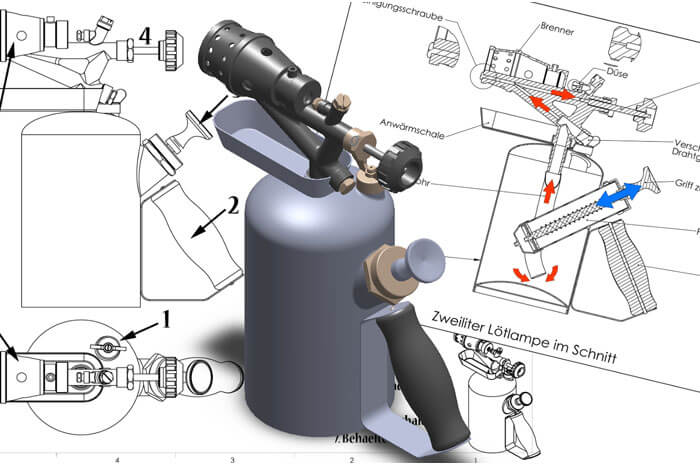Dassault Systems owns the computer-aided design (CAD) 3D Modeling Software program Solidworks 3D Modeling. It is based on the parametric design approach and creates three types of linked files: the part, the assembly, and the drawing. As a result, any change to one of these three files will affect the other two.
For further information, see our article on preparing files for 3D printing with SolidWorks.
Founder Jon Hirsch tick and a team of developers began developing SolidWorks in 1993 to make CAD more accessible.
- The initial version of the program was released in 1995.
- Dassault Systems acquired a majority stake in 1997 and proceeded to improve the software’s features.
- SolidWorks enables you to create 2D and 3D models, and this CAD program is renowned for its simplicity of use and simple interface.
The program SolidWorks helps you to:
- create very exact three-dimensional things
- build products double-check the design of your file
- keep a collection of your 3D models
- develop two-dimensional drawings
- develop visual representations and animations of your three-dimensional objects
- calculate the production cost of your three-dimensional objects
SolidWorks software is compatible with the following three-dimensional file formats:
ACIS, 3D XML, Adobe Illustrator, Adobe Photoshop, Adobe Portable Document Format, Autodesk Inventor, CADKEY, CATIA Graphics, DXF/DWG files, DXF 3D, SolidWorks eDrawings, Highly Compressed Graphics HOOPS, IDF 2.0, IDF 3.0, IDF 4.0, IFC, IGES, JPEG, Mechanical Desktop, Pro/ENGINEER, ProStep EDMED, Rhino, ScanTo3D, Solid Edge, STEP, STL, TIFF, U3D, Unigraphics, VDAFS, Viewpoint, VRML, and XPS.
Although Solidworks 3D Modeling is not a free program, a trial edition is provided to demonstrate some of its capability. Additionally, you may compare all SolidWorks alternatives and rivals.
Our collection of lessons on modeling using CAD software includes a tutorial on SolidWorks as well as all the procedures necessary to create your Solidworks 3D Modeling. After you’ve built your file, don’t forget to export it in STL format to make printing easier! If you run into problems with the export, our section on transferring a 3D file describes how to do it while using SolidWorks software.
If you’re having trouble printing a SolidWorks file, check out our eBook, “Fix your Files.” These resources will assist you in optimizing your 3D files for printing!
Is your 3D model complete? Then upload it and see it come to life!
You will learn the best techniques for modeling, correcting, and exporting an item for 3D printing in this SolidWorks course. By the time you’re finished with this 3D design tutorial, you’ll have mastered the following:
- Using SolidWorks to create a 3D printing-compatible model
- Tools for measurement and analysis that optimize the export of your 3D model in several formats
- Repairing tools to address potential modeling issues
A Brief Overview of Solidworks
This is a modeling application designed for industrial object modeling, but it may be used for much more. It is frequently utilized in the fields of electrical design, general product design, and industrial design.
Its operation is based on the utilization of waves and NURBS. Unlike many other programs, Solidworks 3D Modeling’s design process is not based on a single meshing function that depends exclusively on flat surfaces creating the appearance of curves; rather, it is based on a system of numbers that take the average of those edges to create a smooth surface. The tools enable Solidworks users to achieve a greater level of precision than is possible with traditional approaches. Rather than polygonal modeling, SolidWorks depends on dimensional drawings, which allow for far more precise measurement and scaling of the item. Exporting becomes rapid, simple, and surprisingly light using a system based on these criteria, as each file knows a huge number of NURBS.
